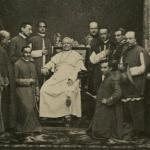Once upon a time, Protestant congregations had pulpits. This was a form of church furniture, a glorified lectern as it where, behind which pastors read the text for their sermon and preached it to boot. Today, contemporary design of church buildings makes little of fixed places for anyone participating in worship, except for the drummer who may be quarantined in a drum shield.
The following comes from the 2003 summer issue of the Nicotine Theological Journal, a time when technology was making it possible for pastors to imitate NFL quarterbacks — not in a good way.
“Happy Feet”
Audio technology has amazingly transformed in small ways the enjoyment of both professional football and Christian worship (though our preference is for only one of these delights per Sunday — we will let perceptive readers figure out which). Miniature cordless microphones specifically have given television audiences access to the banter in huddles between quarterbacks and linemen. They have also allowed many congregations to remove the wired, and usually much more cumbersome, pulpit mike and employ instead a lapel microphone. One advantage is that the pastor who likes to gesture with hands does not now run the risk of knocking out the amplification and recording of his sermon with one fell arm swing.
But for all of technology’s blessings, it has raised temptations for churchmen from which quarterbacks are immune. The conventional wisdom in the National Football League is for the quarterback to stay put in the pocket established by his linemen until one of his receivers breaks free. If a wide receiver or end cannot shake clear from a defender, broadcast analysts and sports talk radio show hosts agree, the quarterback is better advised to throw the ball away. One of the worst things for the quarterback to do is to run down field with the ball. The reason is simple — most quarterbacks are smaller than the rest of the defense and so they jeopardize not only their own health but also a team’s season.
But some quarterbacks don’t like to stay in the pass pocket and a sure sign of this discomfort is a phenomenon called happy feet, a practice more characteristic of a dance step than a batter firmly planting his feet in the batter’s box. Happy feet are supposed to indicate a quarterback afraid of being hit; instead of staying home and trying to throw a pass with proper transfer of weight he throws off the back foot or on the run.
PASTORS ALSO ENGAGE IN A form of happy feet whenever they begin to walk around behind the pulpit. Of course, the reason for pastors not staying home in the preaching pocket has nothing to do with a 300 pound defensive end blind siding him as he is about to declare God’s will for the congregation’s members’ lives, though some church members’ complaints are indeed intimidating. Instead, the sole excuse for happy feet is the cordless microphone. Before its advent a pastor needed to stay in the pulpit to have his voice amplified. Cordless lapel or hand held mikes make such sure footedness unnecessary. A pastor now may not only gesture with impunity but he may also act out some points in the sermon across the platform; some (at least the ones on television) even walk down into the aisles and mix it up with the congregation.
GOD’S WORD SAYS THAT THE flower fades and the grass withers but the word of the Lord endures forever. Pastors are more like the flowers and the grass in that sentiment than they are like God’s word. Even so, as ministers of God’s word, pastors’ actions, including their feet, while communicating a message of such great moment should encourage the idea of permanence. That is one reason for having a pulpit with serious heft. It symbolizes that what goes on in this space is of great significance and enduring value (though some look so permanent that even the coming of the New Heavens and the New Earth will not unsettle them).
The permanence of the word preached is also a reason for ministers to stay in the pocket behind the pulpit and not move around. At best, happy feet is a distraction that calls more attention to the man than his message. At worst, they invite liturgical dance. So if the argument from permanence does not help, maybe the thought of overweight men and women in leotards will assist pastors (some on the rotund side themselves) keep both feet firmly planted behind their congregation’s ample pulpit.












